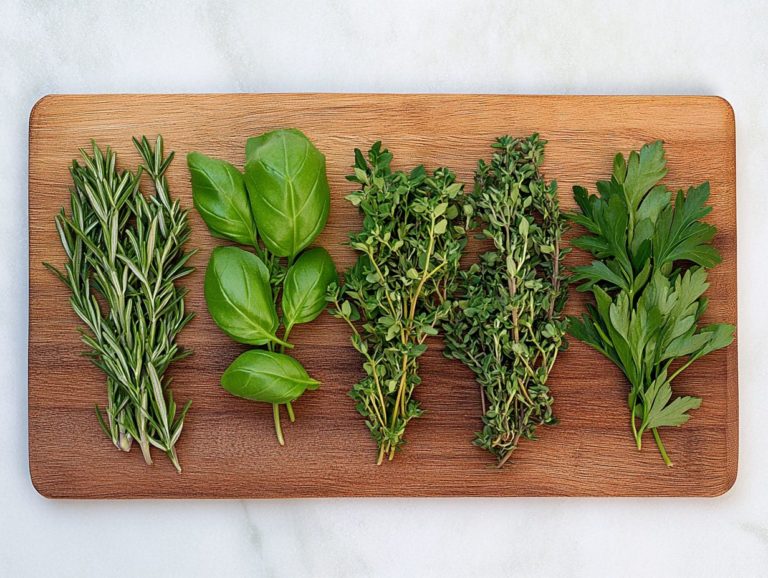Herbs that Promote Healthy Hair Growth
Are you grappling with thinning hair or hair loss? Understanding the fundamentals of hair growth is vital for addressing these concerns effectively.
This article delves into the intricacies of the hair growth cycle and pinpoints common causes of hair loss. It uncovers the remarkable benefits of herbs in fostering healthy hair growth, offering insights into their advantages and practical ways to weave them into your daily routine.
It also highlights other natural remedies to support your hair journey. Get ready to embrace fuller, healthier hair! Continue reading!
Contents
- Key Takeaways:
- The Basics of Hair Growth
- Common Causes of Hair Loss
- Herbs for Promoting Healthy Hair Growth
- How to Use Herbs for Hair Growth
- Other Natural Remedies for Hair Growth
- Frequently Asked Questions
- What are some herbs that promote healthy hair growth?
- How do stinging nettle and horsetail promote healthy hair growth?
- What benefits does rosemary offer for hair growth?
- What is the role of amla in promoting healthy hair growth?
- Can fenugreek help with hair growth?
- How does saw palmetto contribute to healthy hair growth?
Key Takeaways:
- Incorporating herbs into your hair care routine can promote healthy hair growth.
- Understanding the hair growth cycle and identifying the root cause of hair loss can help determine which herbs to use.
- Herbs can be used in various methods and dosages to effectively stimulate hair growth, but results may vary for each individual.
The Basics of Hair Growth
Hair growth is a fascinating biological process shaped by many factors, including genetics, hormonal balance, and overall health.
To truly understand the essentials of hair growth, you must recognize the hair growth cycle, which comprises three critical phases: anagen (the active growth phase where hair gets longer), catagen (the transition phase), and telogen (the resting phase).
Each of these phases is vital in determining the health and density of your hair. Any disruptions in this cycle can lead to hair loss or thinning.
This intricate process is closely tied to the health of your scalp and the nourishment that reaches your hair follicles through proper dietary choices, vitamins, and minerals.
Understanding the Hair Growth Cycle
The hair growth cycle unfolds in three distinct phases: anagen, catagen, and telogen. Each one plays a vital role in your hair s development.
During the anagen phase, which lasts anywhere from two to seven years, your hair is in its active growth stage. This is when your hair follicles are hard at work, continually producing new cells, resulting in increased length and thickness.
Following this is the catagen phase, a brief transitional period of about two to three weeks, where active growth comes to an end as the hair follicles shrink and detach from their blood supply.
Then comes the telogen phase, lasting around three months, during which your hair becomes inactive and eventually sheds, creating space for new growth.
However, this delicate cycle can be disrupted by various factors, such as hormonal changes, stress, nutritional deficiencies, and genetic predispositions. These disruptions can lead to issues like hair loss, significantly impacting your confidence and scalp health.
Common Causes of Hair Loss
Hair loss can stem from a variety of factors, including genetic predispositions like hereditary hair loss, as well as environmental influences and health conditions such as alopecia areata and thyroid disorders.
To truly grasp the common causes of hair loss, it’s essential to recognize how elements like hair shedding, poor dietary choices, and stress can affect your overall mental health, potentially complicating hair growth further.
Each underlying cause may require a personalized approach for effective treatment and management, ensuring you find the solution that works best for you.
Identifying the Root of the Problem
Identifying the root causes of your hair loss is essential for effective treatment, as several factors ranging from hair shedding and dietary deficiencies to medications and mental health issues can contribute to the problem.
Medical assessments, including blood tests and scalp examinations, are pivotal in pinpointing specific issues. These evaluations can help determine whether hormonal imbalances, thyroid problems, or autoimmune conditions are at play in your situation.
Lifestyle factors, such as stress and poor nutrition, can exacerbate hair issues. Therefore, conducting a thorough evaluation of your dietary habits and stress levels is crucial.
It s also important to recognize that certain medications, like those for high blood pressure or depression, may inadvertently affect your hair health. Nutritional deficiencies, particularly in vitamins and minerals such as iron and biotin, can lead to brittle hair and excessive shedding, complicating the overall diagnosis.
Take charge of your hair health today!
Herbs for Promoting Healthy Hair Growth
Herbs have been revered for their remarkable ability to promote healthy hair growth. They utilize nature s bounty to enhance the condition of your hair follicles and scalp. Among the popular choices, stinging nettle stands out for its supportive role in hair regeneration. Rosemary is celebrated for boosting scalp circulation.
Aloe vera works wonders by hydrating and nourishing your scalp. Other noteworthy herbs like horsetail, fenugreek, ginseng, green tea, and red clover each bring unique benefits. This makes herbal solutions appealing for anyone eager to explore natural alternatives to hair growth treatments.
Benefits and Effectiveness
Herbs for hair growth offer benefits beyond just appearance. These herbal extracts can reduce irritation, significantly enhance scalp health, and promote effective hair production. Various herbs have been studied for their remarkable ability to nourish hair follicles and boost blood circulation to the scalp.
They deliver essential nutrients vital for hair renewal and resilience. For example, herbs like rosemary and peppermint invigorate hair growth and contain powerful antioxidants that fight free radicals, helping to prevent potential damage.
By incorporating these botanical wonders into your hair care regimen, you can see substantial improvements in hair texture and strength. This leads to a luscious mane that is visually striking and robust, healthy from roots to tips.
How to Use Herbs for Hair Growth
Harnessing the power of herbs for hair growth can be achieved through various methods, including sumptuous hair oils, rejuvenating hair masks, and specialized topical treatments. These approaches enhance scalp health and significantly improve the overall condition of your hair.
Methods and Dosages
The methods for applying herbs to promote hair growth vary significantly. Choices like herbal oils, supplements, and homemade hair masks offer unique benefits tailored to your specific goals.
Each approach has distinct advantages, designed to suit your preferences and address your hair’s individual needs. For example, you can massage herbal oils directly into your scalp to stimulate blood circulation. Meanwhile, herbal supplements can enhance overall hair health from the inside out.
Creating homemade hair masks with aloe vera and henna nourishes your hair shaft and customizes solutions for concerns like dryness or breakage. To maximize effectiveness, establish a routine that includes accurately measuring supplement dosages and crafting a well-balanced blend of herbs like rosemary and nettle.
Combining different herbs enhances their effectiveness and can lead to more vibrant, resilient hair over time.
Other Natural Remedies for Hair Growth
Beyond herbs, you ll discover a wealth of natural remedies to promote hair growth. This includes making thoughtful dietary adjustments, embracing effective scalp health techniques, and exploring various treatments designed to enhance the vitality of your hair follicles.
Explore Alternative Hair Growth Solutions
Exploring alternative solutions for hair growth reveals effective natural ingredients and hair care products that beautifully complement traditional methods.
By immersing yourself in the world of botanical oils, herbal extracts, and plant-based serums, you can uncover treatments that tackle hair thinning and promote fuller locks. Consider methods like essential oil massages that invigorate the scalp, seamlessly blending with a nutritional approach focused on a diet rich in vitamins A and E.
Incorporating stress management techniques such as mindfulness meditation or yoga can further enhance your hair health by addressing hormonal imbalances that often lead to hair loss. When you combine these strategies, you create a holistic approach that amplifies the effectiveness of each treatment while elevating your overall well-being.
Frequently Asked Questions
Start your journey to healthier hair today! Don’t miss out on these amazing natural remedies for your hair!
What are some herbs that promote healthy hair growth?
Several herbs promote healthy hair growth, including stinging nettle, horsetail, rosemary, amla, fenugreek, and saw palmetto.
How do stinging nettle and horsetail promote healthy hair growth?
Stinging nettle blocks the production of DHT, a hormone linked to hair loss. Horsetail contains silica, which strengthens hair strands.
What benefits does rosemary offer for hair growth?
Rosemary improves circulation in the scalp, stimulating hair growth. It also fights free radicals, reducing damage to hair follicles.
What is the role of amla in promoting healthy hair growth?
Amla, or Indian gooseberry, is rich in vitamin C and antioxidants. These nutrients nourish hair follicles, supporting growth and reducing hair fall.
Can fenugreek help with hair growth?
Absolutely! Fenugreek is a powerful ingredient often found in hair care products. Its high protein and nicotinic acid content strengthen hair and promote growth.
How does saw palmetto contribute to healthy hair growth?
Saw palmetto blocks DHT production, which can lead to hair loss. It also reduces inflammation in the scalp, promoting healthy hair growth.




